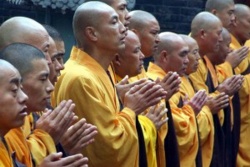Right Action
Right Action (sammā kammanta) is the fourth step on the Buddha’s Noble Eightfold Path. An action is an activity or task done with the body. Negatively, the Buddha defined Right Action as abstaining from killing, stealing and sexual misconduct (M.III,251). Positively, Right Action would be any action motivated by kindness, generosity, patience, the desire to help others or to preserve life.
Right action (samyak-karmānta / sammā-kammanta) can also be translated as "right conduct". As such, the practitioner should train oneself to be morally upright in one's activities, not acting in ways that would be corrupt or bring harm to oneself or to others. In the Chinese and Pali Canon, it is explained as:
And what is right action? Abstaining from taking life, from stealing, and from illicit sex (or sexual misconduct). This is called right action. —Saccavibhanga Sutta
And what, monks, is right action? Abstaining from taking life, abstaining from stealing, abstaining from unchastity: This, monks, is called right action. —Magga-vibhanga Sutta
For the lay follower, the Cunda Kammaraputta Sutta elaborates:
And how is one made pure in three ways by bodily action? There is the case where a certain person, abandoning the taking of life, abstains from the taking of life. He dwells with his... knife laid down, scrupulous, merciful, compassionate for the welfare of all living beings. Abandoning the taking of what is not given, he abstains from taking what is not given. He does not take, in the manner of a thief, things in a village or a wilderness that belong to others and have not been given by them. Abandoning sensual misconduct, he abstains from sensual misconduct. He does not get sexually involved with those who are protected by their mothers, their fathers, their brothers, their sisters, their relatives, or their Dhamma; those with husbands, those who entail punishments, or even those crowned with flowers by another man. This is how one is made pure in three ways by bodily action.
For the monastic, the Samaññaphala Sutta adds:
Abandoning uncelibacy, he lives a celibate life, aloof, refraining from the sexual act that is the villager's way.
